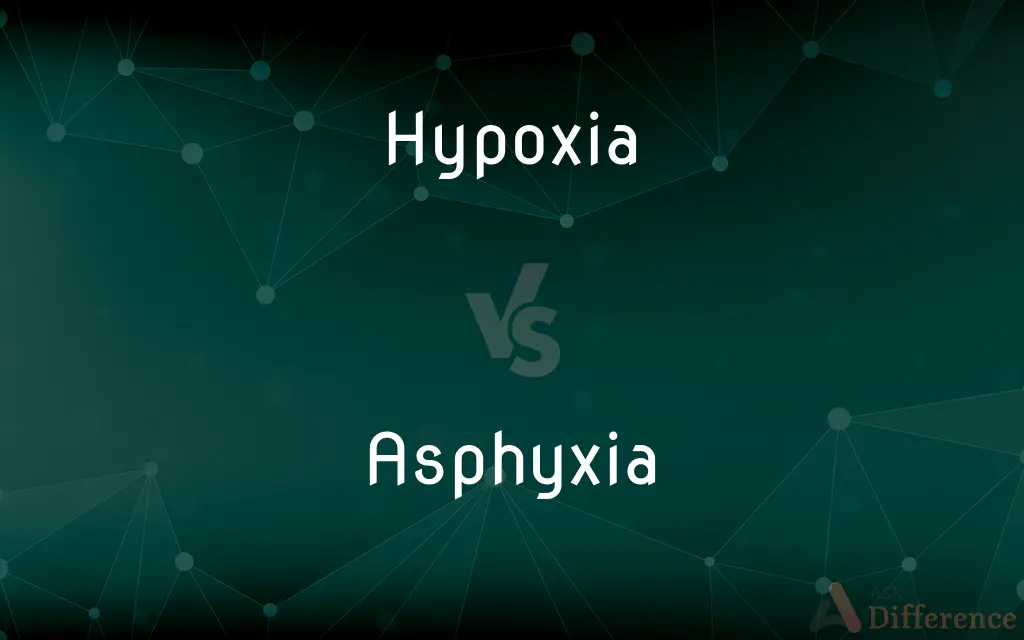Hypoxia vs. Asphyxia — What's the Difference?
Edited by Tayyaba Rehman — By Fiza Rafique — Updated on October 27, 2023
"Hypoxia" refers to reduced oxygen levels reaching body tissues, while "Asphyxia" is a condition caused by the inability to breathe, leading to a lack of oxygen and excess carbon dioxide. Both can result in life-threatening situations.

Difference Between Hypoxia and Asphyxia
Table of Contents
ADVERTISEMENT
Key Differences
"Hypoxia" is a medical term that denotes a decrease in the level of oxygen that reaches the tissues in the body. It can be a result of various factors, not necessarily related to airflow. "Asphyxia," on the other hand, refers specifically to a condition where there's an interruption or insufficiency in the act of breathing, leading to a reduced intake of oxygen and an increased amount of carbon dioxide.
Hypoxia can be caused by multiple conditions such as high altitudes, anemia, or certain diseases affecting lung function. It points to the end result, which is reduced oxygen supply. Asphyxia, however, emphasizes the cause — the interference with breathing, which could be due to choking, drowning, or strangulation.
In medical scenarios, it's vital to distinguish between Hypoxia and Asphyxia because the interventions might differ. For Hypoxia, the primary concern is to increase the oxygen levels in the blood. In the case of Asphyxia, the immediate priority is to restore breathing and airflow.
Symptoms of Hypoxia can vary from shortness of breath, confusion, and rapid heartbeat. Asphyxia might present similar symptoms, but the onset is usually more abrupt and can include unconsciousness due to the sudden lack of oxygen and buildup of carbon dioxide.
In conclusion, while both Hypoxia and Asphyxia revolve around the concept of oxygen deprivation, Hypoxia focuses on the insufficient oxygen in tissues, regardless of cause, while Asphyxia zeroes in on the interruption of breathing as the primary culprit.
ADVERTISEMENT
Comparison Chart
Definition
Reduced oxygen levels reaching tissues
Interruption or insufficiency in breathing
Primary Causes
High altitudes, anemia, lung diseases
Choking, drowning, strangulation
Medical Intervention
Increase oxygen levels in blood
Restore breathing and airflow
Focus
End result (oxygen deprivation in tissues)
Cause (inability to breathe)
Symptoms Presentation
Can be gradual with symptoms like confusion
Usually abrupt, can lead to unconsciousness due to sudden oxygen depletion
Compare with Definitions
Hypoxia
Reduced concentration of oxygen in the blood.
Some respiratory diseases can lead to Hypoxia.
Asphyxia
A condition caused by insufficient intake of oxygen.
Choking on food can lead to Asphyxia.
Hypoxia
A condition where oxygen levels in body tissues are below normal.
High altitudes can cause Hypoxia in climbers.
Asphyxia
Sudden cessation or insufficiency of airflow.
Children playing with plastic bags risk Asphyxia.
Hypoxia
Oxygen deprivation affecting cellular activity.
Prolonged Hypoxia can result in cellular damage.
Asphyxia
Oxygen deprivation due to interference with breathing.
Victims of smoke inhalation can experience Asphyxia.
Hypoxia
A state in which organs receive inadequate oxygen supply.
Without timely treatment, heart failure can cause Hypoxia.
Asphyxia
A life-threatening state due to a lack of air.
Drowning victims suffer from Asphyxia.
Hypoxia
Diminished levels of oxygen in specific regions of the body.
Certain circulatory issues might cause Hypoxia in the limbs.
Asphyxia
Asphyxia or asphyxiation is a condition of deficient supply of oxygen to the body that arises from abnormal breathing. An example of asphyxia is choking.
Hypoxia
Deficiency in the amount of oxygen reaching body tissues.
Asphyxia
A condition in which an extreme decrease in the concentration of oxygen in the body accompanied by an increase in the concentration of carbon dioxide leads to loss of consciousness or death. Asphyxia can be induced by choking, drowning, electric shock, injury, or the inhalation of toxic gases.
Hypoxia
Depletion of dissolved oxygen in aquatic environments to levels that are detrimental or fatal to aerobic organisms, often caused by eutrophication.
Asphyxia
Loss of consciousness due to the interruption of breathing and consequent anoxia.
Asphyxia may result from choking, drowning, electric shock, or injury.
Hypoxia
(pathology) A condition in which tissues (especially the blood) are deprived of an adequate supply of oxygen; anoxia
Asphyxia
Loss of consciousness due to the body's inability to deliver oxygen to its tissues, either by the breathing of air lacking oxygen or by the inability of the blood to carry oxygen.
Hypoxia
A reduced concentration of dissolved oxygen in an aquatic environment.
Asphyxia
A condition in which an extreme decrease in the concentration of oxygen in the body leads to loss of consciousness or death. Replaced in the mid-20th century by the more specific terms anoxia, hypoxia, hypoxemia and hypercapnia.
Hypoxia
A very strong drive resulting from a deficiency of available oxygen in the blood and bodily tissues (short of anoxia)
Asphyxia
Apparent death, or suspended animation; the condition which results from interruption of respiration, as in suffocation or drowning, or the inhalation of poisonous or irrespirable gases.
Asphyxia
A condition in which insufficient or no oxygen and carbon dioxide are exchanged on a ventilatory basis; caused by choking or drowning or electric shock or poison gas
Asphyxia
Accumulation of excess carbon dioxide from interrupted breathing.
Prolonged strangulation can cause Asphyxia.
Common Curiosities
Is Hypoxia always dangerous?
While mild Hypoxia might not be immediately life-threatening, prolonged or severe Hypoxia can be fatal.
Can diseases like anemia lead to Hypoxia?
Yes, anemia can reduce the blood's oxygen-carrying capacity, leading to Hypoxia.
Can Hypoxia occur at high altitudes?
Yes, reduced atmospheric oxygen at high altitudes can cause Hypoxia.
How does Asphyxia lead to unconsciousness?
The sudden lack of oxygen and buildup of carbon dioxide due to Asphyxia can lead to unconsciousness.
What are the symptoms of Hypoxia?
Hypoxia symptoms can include shortness of breath, rapid heartbeat, and confusion.
Is Hypoxia reversible?
With timely medical intervention, the effects of Hypoxia can be reversible.
Are Hypoxia and Asphyxia always life-threatening?
While both conditions can be dangerous, their severity and potential lethality depend on the cause and duration.
What causes Asphyxia?
Asphyxia is caused by interruptions or insufficiencies in breathing, such as choking, strangulation, or drowning.
What is the primary intervention for Asphyxia?
Restoring breathing and airflow is the immediate priority for Asphyxia.
Does Hypoxia always result from breathing issues?
No, Hypoxia refers to reduced oxygen in tissues and can have various causes beyond breathing issues.
Is Asphyxia always sudden in onset?
While Asphyxia can be abrupt due to events like choking, it can also occur gradually in situations like smoke inhalation.
How are Hypoxia and Asphyxia related?
Both involve oxygen deprivation, but Hypoxia focuses on oxygen levels in tissues, while Asphyxia relates to breathing interference.
Can Hypoxia result from Asphyxia?
Yes, Asphyxia, which involves breathing interference, can lead to Hypoxia in body tissues.
Can a person recover from Asphyxia?
Depending on the duration and severity, timely interventions can help a person recover from Asphyxia.
Can both Hypoxia and Asphyxia result from drowning?
Yes, drowning can cause Asphyxia due to water entering the lungs, leading to Hypoxia in body tissues.
Share Your Discovery

Previous Comparison
Catwalk vs. Runway
Next Comparison
This vs. ThusAuthor Spotlight
Written by
Fiza RafiqueFiza Rafique is a skilled content writer at AskDifference.com, where she meticulously refines and enhances written pieces. Drawing from her vast editorial expertise, Fiza ensures clarity, accuracy, and precision in every article. Passionate about language, she continually seeks to elevate the quality of content for readers worldwide.
Edited by
Tayyaba RehmanTayyaba Rehman is a distinguished writer, currently serving as a primary contributor to askdifference.com. As a researcher in semantics and etymology, Tayyaba's passion for the complexity of languages and their distinctions has found a perfect home on the platform. Tayyaba delves into the intricacies of language, distinguishing between commonly confused words and phrases, thereby providing clarity for readers worldwide.















































